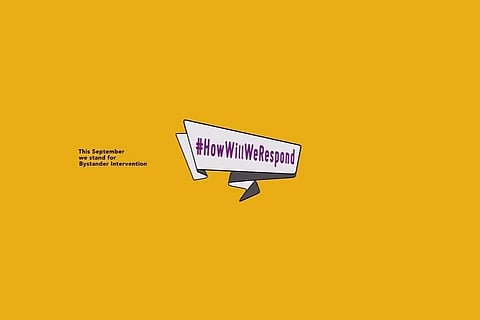

Have you ever witnessed anyone being assaulted or harassed and did not know what to do to help the victim?
Curley Street, a Bengaluru-based film production house, is running a Bystander Intervention(BI) campaign through September to raise awareness and start a conversation around the issue.
What is Bystander Intervention?
Bystander Intervention is largely a violence prevention strategy developed keeping in mind that violent or potentially violent/threatening and even uncomfortable situations often occur in the presence of others.
This means how can we, as part of the society, help someone in distress.
The examples of these situations are quite varied, ranging from witnessing someone being sexually harassed on the street, to a colleague making a racist remark, to a loved one acknowledging signs of depression or distress.
What next?
While many people would want to help a person facing the above situations, they may often be confused regarding what step to take next.
As the campaign states,
"If you witness a situation where it feels like something is wrong or unusual, notice the event and think about options that are within your personal power to respond. If the event has already occurred and you feel you are too late to intervene, instead of walking away, you could check on the person and ask if they are ok, if they need something."
"Bystander intervention deals with interrupting harmful actions or words/comments in the moment when they occur in our presence. The goal is that if every responsible member of our community can act in their individual, small way, to make our environment safer, then it leads to a collective act of humanity towards one another," it adds.
Bystander Intervention does NOT mean putting yourself in harm's way
This is something the campaign stresses on.
BI does not necessarily mean fighting a gang of goons harassing someone, like in the movies.
BI doesn't require people to put themselves in harm's way or confronting the aggressor directly.
The perception that people need to put their lives at risk to intervene is also one of the biggest challenges that BI faces.
"While this could be one of the options you choose to take, bystander intervention provides several indirect and safer ways of interrupting a problematic situation," the campaign states.
Let's say, you hear a friend making sexually inappropriate jokes about someone. You could change the topic, tell your friend why his/her jokes are not okay, talk to someone in a position of authority or excuse yourself from the conversation.
"So, bystander intervention does not mean that you have to change the aggressor’s thoughts/actions or problem solve the situation from start to finish, but more so to interrupt the moment in which something inappropriate/violent occurs or is about to occur or escalate. It is essential that bystanders intervene in a way that is safe and comfortable to them in order for bystanders to want to continue to intervene," is the message of the campaign.
For the campaign, Curley Street has collaborated with clinical psychologist Dr Divya Kannan who specialises in trauma and sexual violence and is also trained in bystander intervention.
They are also working with www.HowRevealing.com to encourage people who have intervened positively in the past to share their stories. www.Hollaback.com, a global movement to end harassment which focuses on BI training, is also helping with campaign.
As part of the campaign, Curley Street will be releasing videos and interviews with experts.